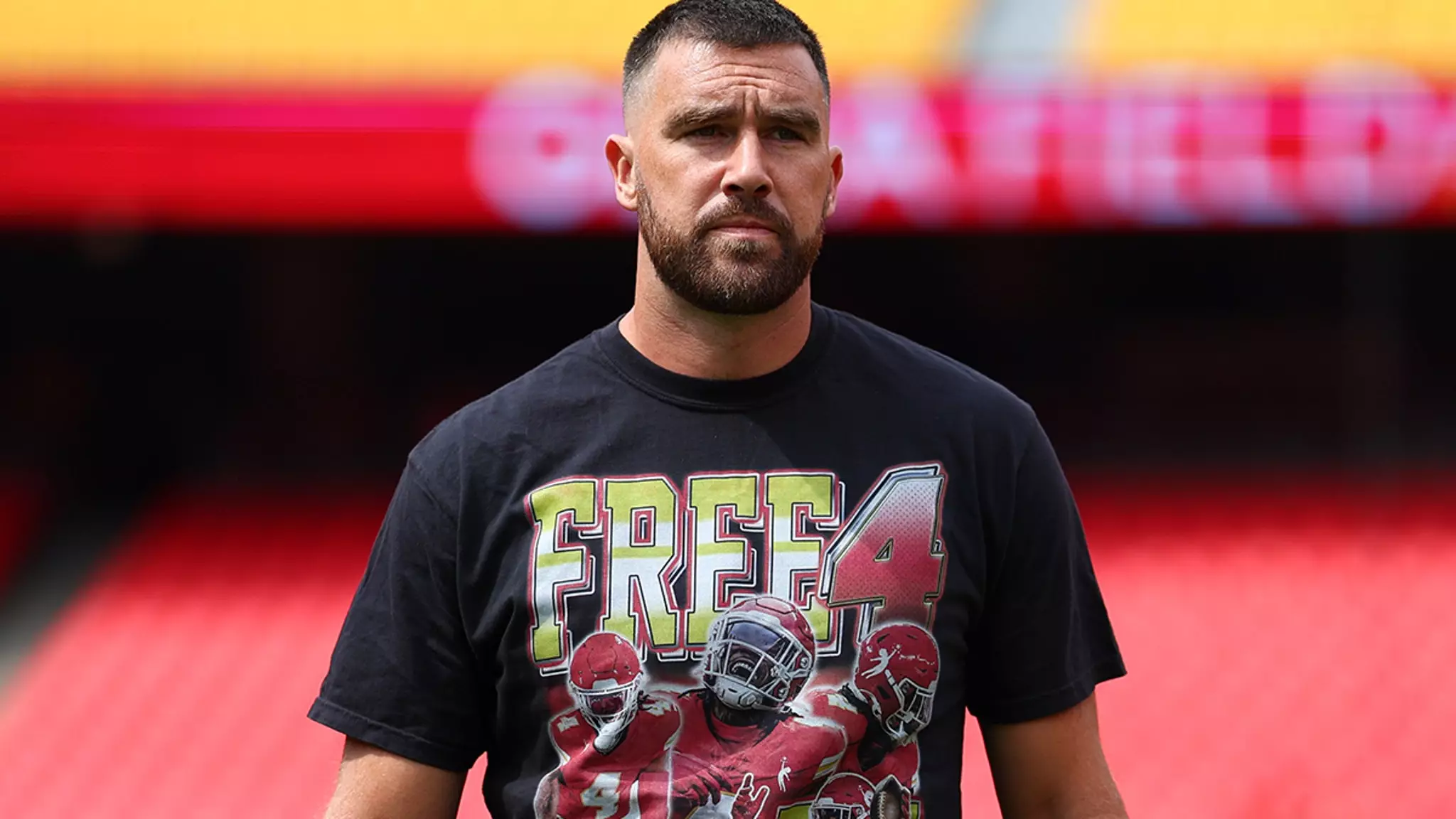In the world of professional sports, athletes are often seen as role models, symbols of resilience, and powerful voices in society. However, their actions outside the game can carry significant weight and consequences, both positive and negative. When Travis Kelce and Tyquan Thornton donned shirts allegedly supporting Rashee Rice amid ongoing legal and ethical controversies, they stepped into a complex realm where loyalty intertwines with morality. Their display wasn’t merely a show of camaraderie—it was a potent statement that raises critical questions about the responsibilities athletes bear and the messages they send.
The decision to wear “Free 4” shirts in support of Rice reveals more than an individual team’s bond; it exposes a cultural phenomenon within sports culture where personal loyalty can sometimes overshadow the need for social responsibility. Athletes wield influence far beyond the confines of the playing field, shaping public opinions and, in some cases, muddying the waters of justice. Such displays can inadvertently trivialize severe allegations, especially when they involve dangerous behavior and legal ramifications. The implication that supporting Rice is equivalent to endorsing reckless actions diminishes the gravity of the incident and undermines accountability.
This controversy underscores a broader debate about the ethical limits of athlete support for teammates entangled in legal or moral scandals. While camaraderie is essential in team dynamics, endorsing or publicly displaying support for someone accused or convicted of serious misconduct sets a troubling precedent. It suggests that personal allegiance might sometimes eclipse societal values or the pursuit of justice. Athletes, with their high-profile platforms, should be cautious in how they express solidarity, ensuring that their actions promote awareness and responsibility rather than inadvertently glorifying misconduct.
Societal Impact and the Double-Edged Sword of Visibility
While Kelce and Thornton might argue that their shirts are simply gestures of teammate support, the wider implications of their actions cannot be ignored. Their choice to wear clothing linked to a controversial figure immediately invites scrutiny, especially from those deeply affected by the incident. The lawyer representing one of the victims articulated this concern vividly. Marc Lenahan’s pointed critique illustrates how public figures’ choices can either challenge or reinforce harmful narratives.
Support that appears to dismiss the gravity of criminal misconduct risks normalizing dangerous behaviors. Rice’s history—racing at high speeds, fleeing from authorities, and pleading guilty to felonies—should serve as stark reminders that actions have consequences. When athletes sideline these consequences for personal loyalty, they send a message that certain reckless behaviors are excusable or worth rallying behind. This undermines societal efforts to promote accountability and could influence impressionable fans to perceive such conduct as less condemnable.
Furthermore, the act of wearing shirts advocating for Rice without addressing the core issues—like restitution to victims—perpetuates a problematic dynamic. Lenahan’s pointed sarcasm about “loans” and “public service warnings” highlights a disconnect: gestures of support that lack tangible actions to address wrongdoings are hollow and potentially harmful. Athletes must recognize that their influence extends to public perceptions of morality, justice, and societal values.
Leadership and the Responsibility of Influence
Contrary to what some might argue, sports figures are not just entertainers—they are societal leaders with an ethical obligation to set positive examples. When they wear symbols that seem to endorse or diminish serious issues, they risk blurring the lines between support and endorsement of misconduct. Fans, especially young ones, often emulate athletes’ behaviors and attitudes, making it essential for those in the spotlight to exercise discernment.
The Kansas City Chiefs’ stance, expressed by head coach Andy Reid, reflects a different perspective—support for Rashee Rice as a teammate rather than an endorsement of his past actions. However, this distinction often fails to assuage critics and victims alike. Symbols, shirts, and public displays are powerful languages that can be interpreted in numerous ways. It’s not enough to claim loyalty; actions must be aligned with values that uphold integrity, responsibility, and respect for justice.
By choosing to wear supportive apparel, athletes like Kelce and Thornton could instead leverage their influence to inspire accountability and promote positive change. They might, for instance, use their platforms to highlight the importance of restitution, rehabilitation, and responsible behavior. Supporting a teammate should never come at the expense of endorsing dangerous conduct or dismissing victims’ suffering. True leadership lies in balancing loyalty with moral clarity, and in making statements that reinforce societal norms of accountability than undermine them.
—
In the end, athlete support is a double-edged sword. While camaraderie and team loyalty are vital, they must be tempered with an awareness of the broader societal implications. Heroes on the field should also strive to be role models off it—champions of integrity, responsibility, and justice. When athletes falter in this domain, they risk not just their reputations but also the values they’re supposed to embody, leaving fans and society questioning their true commitment to the ideals of sport and integrity.

Leave a Reply